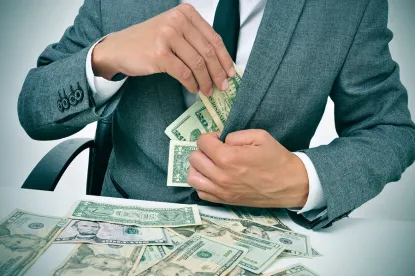In the midst of the Coronavirus (COVID-19) pandemic, states are closely monitoring companies’ pricing of personal protective equipment, food and other essential supplies. This On the Subject offers an overview of state price gouging laws and practical considerations for businesses as they face supply pressures and increased consumer demand.
IN DEPTH
States are extremely active in monitoring companies’ pricing for products necessary to combat the Coronavirus (COVID-19) pandemic, creating significant enforcement risks for companies selling these items. In the midst of the COVID-19 pandemic, demand for personal protective equipment, foods and other essential supplies has risen dramatically, placing significant pressures on supply. In normal times, there would be nothing problematic about a seller’s unilateral decision to increase its prices in response to higher consumer demand. However, with emergency declarations in most—if not all—states, such price increases may lead to hefty civil fines and even imprisonment under state laws prohibiting price gouging.
Price gouging occurs when sellers charge excessively high prices for products and services during public emergencies. There is no federal price gouging law, although members of Congress have proposed such legislation in recent weeks. Most states have explicit laws that prohibit price gouging during declared emergencies, such as tornadoes, hurricanes, fires and pandemics. Other states prosecute unlawful price gouging under their general prohibitions against unfair or deceptive trade practices. Sellers that offer products via the online marketplace face enforcement in multiple states. Read on for an overview of the different elements of state price gouging laws along with a few practical considerations.
State Laws Overview
Threshold Price Increase that Amounts to a Violation
State price gouging laws typically use two distinct baselines for measuring a prohibited price increase.
-
The seller’s price for the product prior to the emergency declaration
-
The price at which the product was readily obtainable in the marketplace prior to the emergency declaration.
The baseline periods measured can vary by state. For example, California and New York both use the price “immediately prior” to the emergency declaration for these measures. Florida looks at the product’s average price in the 30 days prior to the emergency declaration, and Pennsylvania uses the average price in the last seven days prior to the emergency declaration.
Some states such as Florida, New York and Texas, generally prohibit “unconscionable” or “excessive” price increases during a declared emergency, but do not define these terms. Other states identify specific percentage increases that are presumed unlawful. For example, in California and New Jersey, a price increase of greater than 10% is presumed unlawful, and in Pennsylvania, a price increase of greater than 20% is prima facie evidence of unlawful price gouging.
Types of Products and Sales Covered
In the context of COVID-19, products covered could include masks, gloves and other personal protective equipment, medications, medical devices, food and many other items. Most state price gouging laws cover a broad range of products and services used by consumers during a public emergency. For example, New Jersey’s law covers “any merchandise which is consumed or used as a direct result of an emergency or which is consumed or used to preserve, protect, or sustain the life, health, safety or comfort of persons or their property.” A few states, such as Vermont, limit their price gouging laws to petroleum products. Massachusetts’ attorney general issued an emergency regulation expanding the state’s price regulation that applies to gasoline and petroleum products to cover “any goods or services necessary for the health, safety or welfare of the public.”
Most state price gouging laws are not limited to consumer sales. For example, New York’s and Pennsylvania’s laws explicitly apply to “any party within the chain of distribution.” Therefore manufacturers, distributors and retailers face potential enforcement risk. California’s law, on the other hand, prohibits price gouging only on consumer sales.
Potential Civil Fines and Criminal Penalties
Violators of state price gouging laws face significant potential civil and criminal penalties. In California, price gougers face imprisonment of up to one year. Florida allows for a 60-day maximum sentence. New York authorizes judges to impose civil penalties of up to $25,000 in addition to customer restitution in proceedings brought by the attorney general to enjoin price gouging practices. California’s law imposes a maximum $10,000 fine per violation, but explicitly states that price gouging is also a violation of California’s Unfair Competition Law and that the remedies and penalties of the price gouging law and the Unfair Competition Law are cumulative to each other. State statutes typically indicate a civil penalty amount “per violation.”
Practical Considerations
-
Most state price gouging laws contain explicit exceptions for price increases attributed to increased costs. It is important for sellers to keep documents and records sufficient to demonstrate the cost/price relationship to respond to attorney general investigations.
-
There is a high degree of enforcement scrutiny from state attorneys general. Some attorney general offices are receiving thousands of consumer complaints and have launched investigations and enforcement actions. Florida Attorney General Ashley Moody recently announced that her office has already contacted more than 4,500 merchants and obtained more than $240,000 in consumer refunds. Sellers of certain essential products should anticipate outreach from enforcement agencies. Consumers and enforcement agencies lack insight into sellers’ costs and gross/net margins. Quickly responding to inquiries from government investigators with documents and data related to costs may stem more formal investigatory actions, such as civil investigative demands or subpoenas.
-
Sellers should be mindful of the reputational risks associated with engaging in price gouging conduct. One company that manufactures personal protective equipment has launched several trademark lawsuits alleging that resellers misused its trademark in selling its masks at grossly inflated prices. Additional manufacturers may take similar actions to publicly clear their image in the face of opportunistic price gougers.




 />i
/>i
